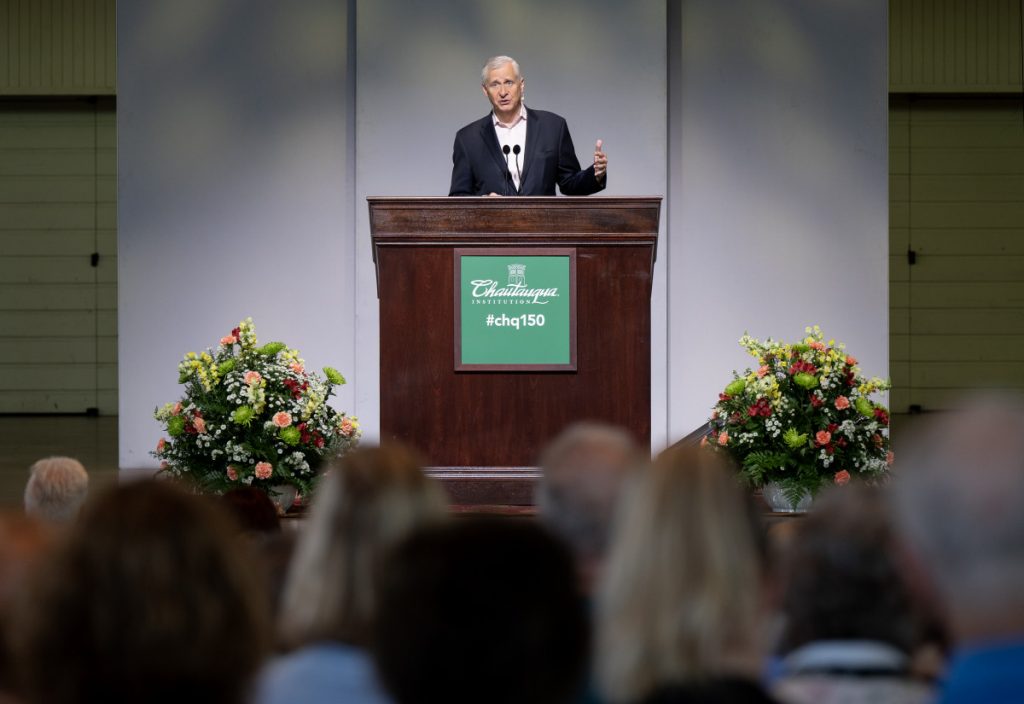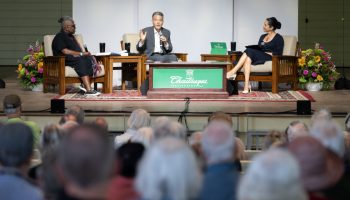
Presidential historian and Pulitzer Prize-winning author Jon Meacham opens the 2024 Chautauqua Lecture Series and the theme of “The Evolution of the Modern Presidency” Monday in the Amphitheater.
A president’s character and humanity is essential to lead a democracy, historian and Pulitzer Prize-winning author Jon Meacham emphasized during his morning lecture Monday in the Amphitheater.
Meacham’s lecture opened this week’s Chautauqua Lecture Series’ theme, “The Evolution of the Modern Presidency,” and focused on supporting the foundations of the U.S. Constitution, highlighting the history of the American presidency and outlining presidential characteristics that have uplifted the country.
He began by urging the audience to remember that we, the people, play an essential role in the functioning of American democracy and in deciding who leads the country as president.
“Without our devoted, dedicated and determined citizenship, the American republic might not long endure, and that is not a sentence I would have uttered 10 years ago,” he said.
Amid growing political polarization and as the United States gears up for another presidential election in November, he said now is a crucial time to remember where our country has been and where it can go from here.
Meacham, who is non-partisan and who has voted for both Democratic and Republican candidates, said the current political moment should not be focused on personal political beliefs or policies, but on the foundations of the Constitution, which he said was “designed to lead a fallen, frail and fallible people.”
“I am a boringly heterosexual, white Southern male Episcopalian,” he said. “Things work out for me in this country. The point of the country, though, is that it is supposed to work out for everyone. And we created that expectation.”
It is crucial to set aside certain policy disagreements to vote for a particular candidate who “embraces the constitutional order over his own appetite and ambitions,” said Meacham.
“Here is something we can usefully think about, which is that the American presidency, far more often than we would like to think, is more of a mirror of who we are than it is a maker,” he said.
He discussed some history of the office of president and highlighted moments that shed light on the presidency as it exists now.
Meacham referenced ways that past historical figures have defined the American presidency, adding that Alexander Hamilton said “the energy in the executive is the chief characteristic of a good government,” and that Thomas Jefferson defined the presidency as “the office and the point at which one must unite the competence of the whole people and move with one heart and one mind towards a particular end.”
Meacham emphasized that the role of the president has historically helped define what is moral and decent within the culture of American politics, and when American democracy is practiced the best, it is the “fullest manifestation of how we can conduct ourselves morally by following certain agreed-upon laws, even if we don’t agree with them.”
“If we don’t agree with the particular, we agree with the covenant in order to create a politics that is not an occasion for total war every hour of every day, but is in fact an arena of contention in which we seek to resolve problems for a particular period of time while obeying certain rules,” he said.
The presidential office is like the anchor of America, Meacham explained. It can be compared to a balancing act that has the power to do tremendous harm and tremendous good.
He defined three characteristics that American presidents have brought to the Oval Office that have uplifted the country.
Curiosity, the first characteristic, is one that our greatest presidents have emanated throughout history, and it can serve as a model to help resolve problems within our democracy.
“One of the points of the Constitution was to replace reflexive strength and raw power as the governing force in human affairs … with reason, deliberation and, as Hamilton said, the American Constitution was an exercise in whether governments could be formed by reflection and deliberation as opposed to force and accident,” Meacham said.
In the current presidential election era, according to Meacham, we have had a president who tended to use force and an incumbent president who leans toward reason.
“It is not just the job of the president,” he said. “The president becomes the tip of the spear, to speak — the embodiment — but we are all tributaries that feed into this river.”
As Americans, Meacham said we must remain curious about the challenges our country and world faces, including isolationism, authoritarianism, a fear of globalization and other pressing issues.
“We have been given a heart and a mind, an appetite and a thirst to know,” Meacham said. “We must honor that gift and the use of it.”
The second characteristic vital to American presidents is candor.
He drew this characteristic from President Franklin Delano Roosevelt, who displayed this during his famous “Fireside Chats” to Americans during World War II.
“He said, ‘The news is going to get worse and worse before it gets better and better. The American people deserve to have it straight from the shoulder.’ ”
As someone who has written about American presidents for 30 years, Meacham said he was never able to fully understand the pressure of being in the Oval Office until he was invited to the White House in January by President Joe Biden.
During a conversation with the president that Meacham recalled as embarrassing, he was asked to explain his opinion on something, and as the walls of the White House seemed to be caving in on him, he couldn’t seem to get his thoughts together.
“It’s incredibly difficult on a human level to tell the truth in that setting,” Meacham said. That’s why, he explained, the American president must be candid.
The last characteristic of a president – one that Meacham called “the oxygen of democracy” – is empathy.
President George H.W. Bush was the most empathetic man Meacham has ever known, and he told a story of one of Bush’s classmates from the 1930s, Bennett McNichol.
During an annual obstacle course race at his school, Bush, who always won the race, was told by his teachers to give his classmates a head start. As the race began and as Bush caught up with the other children and squeezed through a barrel, he noticed McNichol to his right, who was heavyset and stuck in a barrel.
Instead of moving ahead and leaving his classmate behind, he decided to help him from the barrel.
“He reaches down, pulls him out and says, ‘Come on, Bennett, we will finish this together,’ ” Meacham said.
Meacham later told Bush that he heard the story of his classmate, and asked why he helped McNichol out of the barrel.
“He looked at me as if I were crazy and said, ‘I have never been stuck in a barrel, but if I had been, I would want somebody to pull me out.’ ”
The story sticks with Meacham because it is an example of the power of common decency and human empathy, which are traits that are at the heart of our democracy.
“That is the definition of democratic citizenship that is absolutely essential, because it is grounded in reality,” he said.




